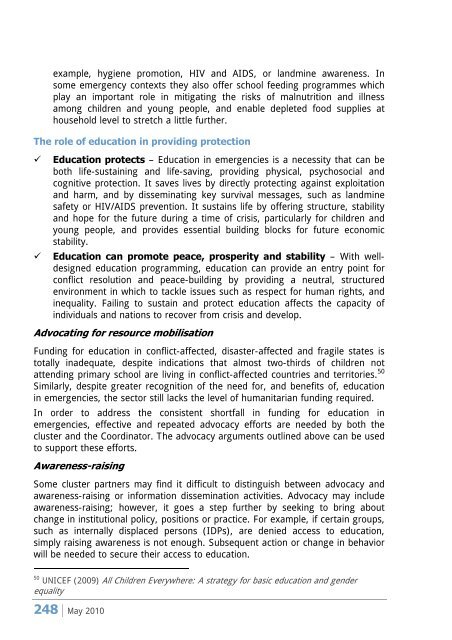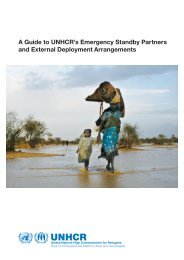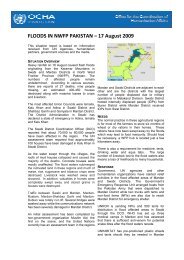Advocacy and resource mobilisation - OneResponse
Advocacy and resource mobilisation - OneResponse
Advocacy and resource mobilisation - OneResponse
You also want an ePaper? Increase the reach of your titles
YUMPU automatically turns print PDFs into web optimized ePapers that Google loves.
example, hygiene promotion, HIV <strong>and</strong> AIDS, or l<strong>and</strong>mine awareness. In<br />
some emergency contexts they also offer school feeding programmes which<br />
play an important role in mitigating the risks of malnutrition <strong>and</strong> illness<br />
among children <strong>and</strong> young people, <strong>and</strong> enable depleted food supplies at<br />
household level to stretch a little further.<br />
The role of education in providing protection<br />
� Education protects – Education in emergencies is a necessity that can be<br />
both life-sustaining <strong>and</strong> life-saving, providing physical, psychosocial <strong>and</strong><br />
cognitive protection. It saves lives by directly protecting against exploitation<br />
<strong>and</strong> harm, <strong>and</strong> by disseminating key survival messages, such as l<strong>and</strong>mine<br />
safety or HIV/AIDS prevention. It sustains life by offering structure, stability<br />
<strong>and</strong> hope for the future during a time of crisis, particularly for children <strong>and</strong><br />
young people, <strong>and</strong> provides essential building blocks for future economic<br />
stability.<br />
� Education can promote peace, prosperity <strong>and</strong> stability – With welldesigned<br />
education programming, education can provide an entry point for<br />
conflict resolution <strong>and</strong> peace-building by providing a neutral, structured<br />
environment in which to tackle issues such as respect for human rights, <strong>and</strong><br />
inequality. Failing to sustain <strong>and</strong> protect education affects the capacity of<br />
individuals <strong>and</strong> nations to recover from crisis <strong>and</strong> develop.<br />
Advocating for <strong>resource</strong> <strong>mobilisation</strong><br />
Funding for education in conflict-affected, disaster-affected <strong>and</strong> fragile states is<br />
totally inadequate, despite indications that almost two-thirds of children not<br />
attending primary school are living in conflict-affected countries <strong>and</strong> territories. 50<br />
Similarly, despite greater recognition of the need for, <strong>and</strong> benefits of, education<br />
in emergencies, the sector still lacks the level of humanitarian funding required.<br />
In order to address the consistent shortfall in funding for education in<br />
emergencies, effective <strong>and</strong> repeated advocacy efforts are needed by both the<br />
cluster <strong>and</strong> the Coordinator. The advocacy arguments outlined above can be used<br />
to support these efforts.<br />
Awareness-raising<br />
Some cluster partners may find it difficult to distinguish between advocacy <strong>and</strong><br />
awareness-raising or information dissemination activities. <strong>Advocacy</strong> may include<br />
awareness-raising; however, it goes a step further by seeking to bring about<br />
change in institutional policy, positions or practice. For example, if certain groups,<br />
such as internally displaced persons (IDPs), are denied access to education,<br />
simply raising awareness is not enough. Subsequent action or change in behavior<br />
will be needed to secure their access to education.<br />
50<br />
UNICEF (2009) All Children Everywhere: A strategy for basic education <strong>and</strong> gender<br />
equality<br />
248 | May 2010











